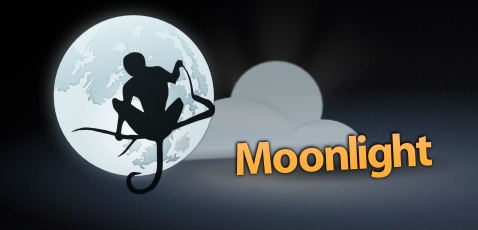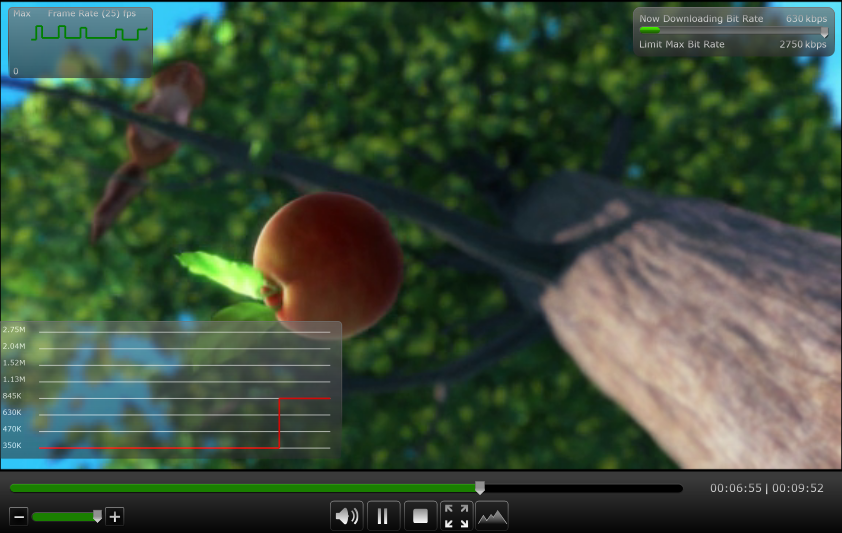Releasing Moonlight 2, Roadmap to Moonlight 3 and 4
Today we are making a few of announcements:
- Moonlight 2 is complete: Moonlight 2, our open source implementation of Silverlight 2 is done.
- An updated collaboration agreement between Microsoft and Novell to bring Silverlight 3 and 4 to open source Unix.
- Microsoft has an updated patent covenant that will covers third party distributions.
Update: Sean Michael Kerner covers the announcement and talks to Brian Goldfarb from Microsoft.
Update 2: New covenant from Microsoft has been posted.

2.5 API
Moonlight 2 is a superset of Silverlight 2. It contains everything that is part of Silverlight 2 but already ships with various features from Silverlight 3:
- Silverlight 3 Pluggable Pipeline, this allows
developers to hook into the media decoding pipeline at
various points:
- Data fetching (this is how adaptive streaming and smooth streaming are supported). Test it out at Experience Smooth Streaming.
- Demuxing (this is how the Moonlight Ogg container can be fed into Moonlight and Microsoft's Silverlight).
- Codecs (this is how our Vorbis and Dirac support work on both Moonlight and Microsoft Silverlight).
- Easing animation functions
- Partial out-of-browser support
- Writable bitmaps
- Some of the new databinding features of XAML in Silverlight 3
We are moving quickly to complete our 3 support. Microsoft is not only providing us with test suites for Moonlight but also assisting us in making sure that flagship Silvelright applications work with Moonlight.
When it comes to prioritization of Silverlight 3 features, we are going to focus on getting the major applications that users want to use first. Sunday Night Football, the Winter Olympics and Bing's Photosynth support.
Smooth streaming works really well. Visit the site and test the immediate seek, and play with the bandwidth limiter to see how Silverlight/Moonlight can adapt the video quality based ont he bandwidth available:

Moonlight 2
Moonlight 2 is the result of love and passion to bring the Silverlight runtime to Linux.
Moonlight 2 engine consists of 142,000 lines of C/C++ code and 320,000 lines of C# code (125,000 lines of code came from Microsoft's open source Silverlight Controls).
Moonlight is built on top of Mono 2.6 runtime, Cairo and Gtk+ and today supports Firefox on Linux. We are hard at work to support Google Chrome on Linux as well.
Updated Patent Covenant
We worked with Microsoft to make sure that Moonlight was available to everyone on Linux and BSD.
Culturally, we started on two opposite ends of the software licensing spectrum. The covenant that was issued for Moonlight 1 and 2 covered every user that used Moonlight, but only as long as the user obtained Moonlight from Novell. This is a model similar to how Flash is distributed: there is a well-known location where you get your plugin.
The open source world does not work that way though. In the open source world, the idea is to release source code and have distributions play the role of editors and curators and distribute their own versions of the software.
Microsoft's intention was to expand the reach of Silverlight, but the original covenant was not a good cultural fit. We worked with the team at Microsoft (Brian Goldfarb and Bob Muglia's teams) to make sure that the covenant would cover the other Linux distributions.
The new patent covenant ensures that other third party distributions can distribute Moonlight without their users fearing of getting sued over patent infringement by Microsoft.
There is one important difference between the version of Moonlight that will be available from Novell and the version that you will get from your distribution: the version obtained from Novell will have access to licensed media codecs.
Third party distributions of Moonlight will be able to play unencumbered media using Vorbis, Theora and Ogg inside Moonlight (and Silverlight), but for playing back other formats, they will have a few options:
- Negotiating directly with the media codec owners a license (MPEG-LA, Fraunhofer).
- Negotiate access to Microsoft's Media Pack with Microsoft.
- Plug-in GStreamer or another commercial codec license into their Moonlight implementations.
- Update: Use a hardware provided decoder like VDPau.
Moonlight 3 and Moonlight 4 Collaboration Agreement
As readers of my blog know, the Silverlight 4 feature set is something that is very interesting to me.
If our experience with the positive feedback that we have gotten from MonoDevelop is of any indication Silverlight 4 will enable a whole new class of cross-platform .NET application development to take place. Like nothing we have seen before.
We are thrilled to be working with Microsoft to make sure that we can improve, fix and fine tune Moonlight to meet those requirements and to do so in a purely open source fashion.
Update: Team Silverlight blogs.
Posted on 17 Dec 2009
Blog Search
Archive
- 2024
Apr Jun - 2020
Mar Aug Sep - 2018
Jan Feb Apr May Dec - 2016
Jan Feb Jul Sep - 2014
Jan Apr May Jul Aug Sep Oct Nov Dec - 2012
Feb Mar Apr Aug Sep Oct Nov - 2010
Jan Feb Mar Apr May Jun Jul Aug Sep Oct Nov Dec - 2008
Jan Feb Mar Apr May Jun Jul Aug Sep Oct Nov Dec - 2006
Jan Feb Mar Apr May Jun Jul Aug Sep Oct Nov Dec - 2004
Jan Feb Mar Apr May Jun Jul Aug Sep Oct Nov Dec - 2002
Jan Feb Mar Apr May Jun Jul Aug Sep Oct Dec
- 2022
Apr - 2019
Mar Apr - 2017
Jan Nov Dec - 2015
Jan Jul Aug Sep Oct Dec - 2013
Feb Mar Apr Jun Aug Oct - 2011
Jan Feb Mar Apr May Jun Jul Aug Sep Oct Nov Dec - 2009
Jan Feb Mar Apr May Jun Jul Aug Sep Oct Nov Dec - 2007
Jan Feb Mar Apr May Jun Jul Aug Sep Oct Nov Dec - 2005
Jan Feb Mar Apr May Jun Jul Aug Sep Oct Nov Dec - 2003
Jan Feb Mar Apr Jun Jul Aug Sep Oct Nov Dec - 2001
Apr May Jun Jul Aug Sep Oct Nov Dec